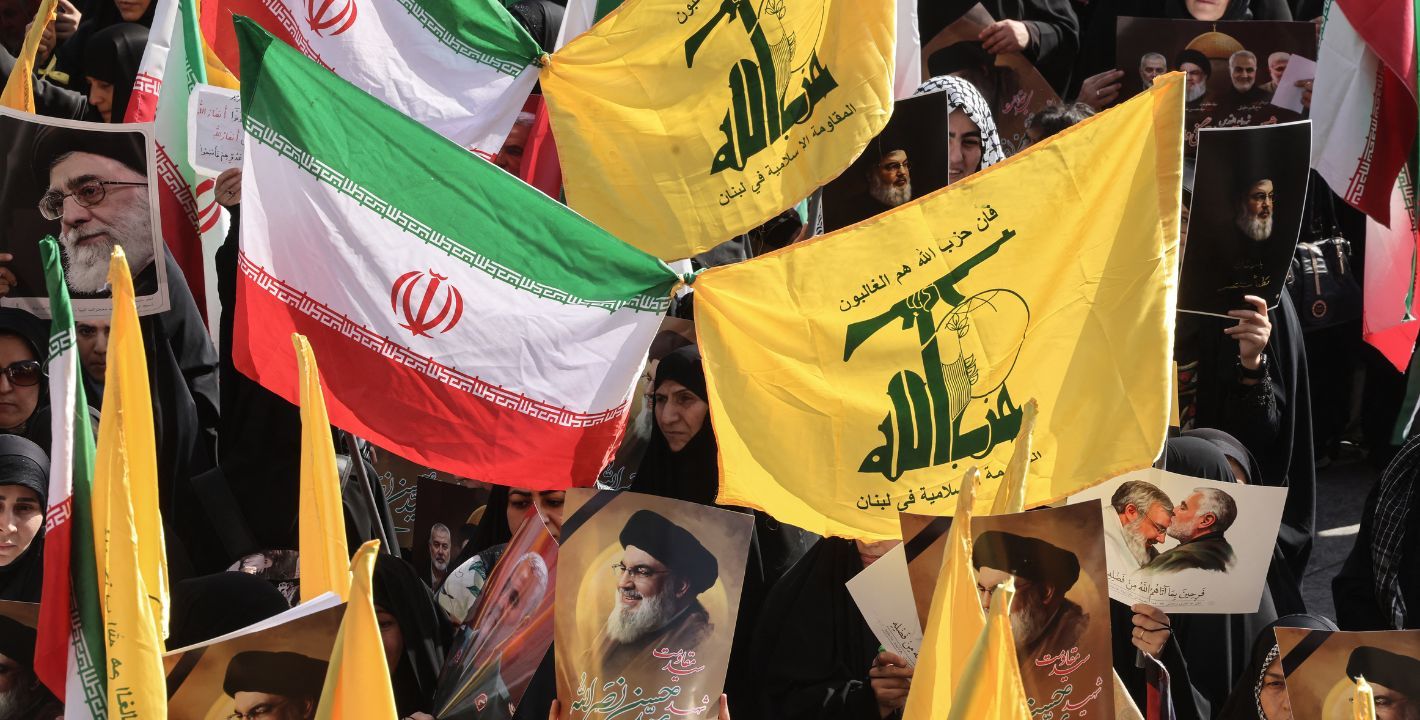With each passing day since Israel launched its ongoing military campaign against Iran on June 13, the question of whether Hezbollah will enter the conflict—whether at Iran’s request or of its own accord—has become more pressing. Will the Lebanese Shiite party join the fight, despite its defeat in the two-month war last year (September–November, 2024), in which Israel wreaked destruction across south Lebanon, the Beqaa Valley, and the southern suburbs of Beirut? Or will it stand aside and allow the confrontation to remain one between Israel and Iran?
This is no simple decision for a group that is both ideologically aligned with Iran and structurally dependent on it. Hezbollah receives direct funding and military support from Tehran and adheres to the doctrine of wilayat al-faqih, which grants Iran’s Supreme Leader, currently Ali Khamenei, divine authority over the Lebanese party’s direction. Additionally, the two-month war with Israel exposed the embedded role of Iranian generals within Hezbollah, whether as part of its seven-member Shura Council or its joint command centers. Their influence likely deepened following the war’s end, given the void in Hezbollah’s top leadership following the killing of Secretary-General Hassan Nasrallah, his successor Hashem Safieddine, and much of the military top brass last year.
So far, however, Hezbollah has opted for restraint. As expected, the party has issued statements of solidarity with Iran and condemned the Israeli attacks. Yet its officials and the media figures moving within its orbit have assured Lebanese authorities and the public that, provided the conflict remains an Israeli-Iranian affair, Hezbollah will not intervene. This may change should the United States take a more active role in Israel’s offensive. An anonymous Iranian official told Al Jazeera that Hezbollah will join the war if the U.S. military intervenes. The U.S. special envoy for Syria, Tom Barrack, subsequently warned the organization that this would be a “very bad decision.”
Hezbollah’s cautious stance thus far is understandable. After all, the party emerged battered from the 2024 conflict. It lost a significant portion of its missile arsenal and many senior leaders. Additionally, the string of exploding pagers and walkie-talkies belonging to Hezbollah members or affiliates, a long-planned attack orchestrated by Israeli intelligence services, dealt the party a devastating blow.
Moreover, politically, Hezbollah’s grip on the Lebanese state has weakened. The election of U.S.-backed army chief Joseph Aoun as president and the formation of Prime Minister Nawaf Salam’s government have shifted the balance of power against the party. Disarmament is now a top national priority, one regularly mentioned in the president’s and prime minister’s statements. Both have emphasized that this will occur through dialogue and not coercion—though that is something that could change in the event of another war. In line with the November 2024 ceasefire agreement between Israel and Lebanon, the Lebanese army has reportedly dismantled over 90 percent of Hezbollah’s military infrastructure in areas south of the Litani River.
That said, and leaving Iran aside, the current status quo is not sustainable. Despite the November ceasefire, Israel has continued its airstrikes and drone attacks, targeting Hezbollah members and destroying residential buildings allegedly used by the group. These attacks have impinged on Hezbollah’s ability to regroup while also fueling domestic and international demands for its complete disarmament. The ceasefire has thus evolved into a tool of pressure against Hezbollah: militarily, politically, and economically.
Compounding matters, Israel has blocked displaced Lebanese civilians from returning to their border villages, even as it allows observant Israeli Jews access to sites within Lebanon that they deem to be of religious significance. This has sparked fears of a creeping settlement strategy similar to what may unfold in Gaza. For Hezbollah, the situation is deeply troubling. Some voices within the party’s support base now argue in private for making use of its deterrent capabilities—not to provoke a war, but to prevent another Israeli land grab.
Even such limited pushback for the purpose of protecting Lebanon itself, as opposed to supporting Iran, carries risks. Not only is Hezbollah’s principal backer, the Iranian regime, locked in an existential war, but the party’s own resources have been depleted, its leadership shaken, and its political space diminished. Iranian financial support—already under pressure from sanctions and war—may dry up, especially as Hezbollah’s own reconstruction and operational costs soar. Engaging in a military confrontation with Israel, however defensive in nature, would more than likely come at a great cost.
And if that is the case, a more robust military engagement with the Jewish state, undertaken in order to avenge Iran, would almost certainly prove costlier. Much of the world has largely abandoned the principles of international law and accountability, as evidenced by the collective punishment, ethnic cleansing, and starvation tactics Israel has employed with impunity in Gaza. As such, an emboldened and unrestrained Prime Minister Benjamin Netanyahu could well respond to any Hezbollah operation by pulverizing Lebanon. With their country beset by economic social, and political crises, many Lebanese are waiting to see whether Hezbollah will choose to fight someone else’s war or finally make the hard choice to prioritize its own political survival and the future of Lebanon’s Shiite community.





